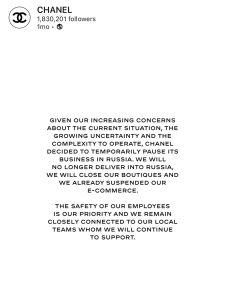At a time when the retail industry, both globally and regionally, was starting to heal from the coronavirus pandemic, low consumer confidence, rising inflation, and supply chain issues, the war between Russia and Ukraine has again set it back.
Already several top retail brands have temporarily pulled out of Russia. Over a month ago, global luxury brand Chanel issued a statement on LinkedIn that read: “Given our increasing concerns about the current situation, the growing uncertainty, and the complexity to operate, Chanel decided to temporarily pause its business in Russia. We will no longer deliver into Russia, we will close out boutiques, and we already suspended our e-commerce.”
That’s not all. Earlier this month Chanel stores in the UAE reportedly refused to sell products to customers of Russian origin unless they signed a document explicitly agreeing to not use the products in Russia.
‘Russophobia’

“I have always loved the Chanel brand. And last year it so happened that several bags, several earrings and my favorite beads were stolen from my suitcase. .😤
Chanel refuses to sell its products. Western boutiques ask for data for identification, and when you give your Russian number, the sellers say, they say, now we sell things to Russians only on the promise that they will not take them to Russia and will not wear them there👀Russophobia in action. I have experienced this in my case as well. Recently, my son turned 7 years old and I bought us a trip to Dubai as a gift. And I bought tickets and booked a hotel three months ago. Now, of course, I thought to fly or not. But the child wants a holiday, gave him this vacation. So, we flew with Danyusha to Dubai and went for a walk in the Mall. I wanted to see earrings, bags at Chanel. Since I often come to Dubai as the host of Fashion Week, Chanel managers recognized me, approached me and said: “We know that you are a celebrity in Russia, we know that you will take purchases there, so we cannot sell you our brand items “. Oops, I thought. And I remembered that in 2016 archival documents were declassified, from which it followed that Coco Chanel was not only the mistress of the Nazi, attaché of the German embassy Baron Hans Günther von Dinklage, but also an agent of German intelligence🧐 Among the documents released was a letter from an anonymous source in Madrid to the French Resistance. In these secret papers, Chanel was recorded as an agent of the Abwehr, the military intelligence and counterintelligence agency of the Third Reich in 1919-1944. At the same time, historians do not exclude that the Nazis could use Chanel as a potential source of information and as an executor of orders, but she herself was not aware of the fact of such cooperation. However, the actions of her legacy, her brand make you think about the biography of Coco Chanel. Supporting fascism and Russophobia is so low 😢
Some humiliated and infuriated Russian customers took to social media to voice their disappointment in Chanel and complained of ‘Russophobia’. Among them was Russian artist and social media influencer Anna Kalashnikova, with 2.4 million followers on Instagram.
However, when TRENDS reached out to Kalashnikova for comments on the matter and how she feels about being discriminated against, her PR team responded with “not ready to comment.”
A similar reaction came from a Dubai-based Russian creative entrepreneur and content creator who wished to remain anonymous said in an email response to TRENDS: “I have to decline in giving comments, as this could hurt me in multiple ways, although of course I have something to say.”
At this point it must be emphasized that as a business hub, the UAE treats buyers and sellers equally. The country’s anti-discriminatory and anti-hatred law clearly provides a solid legislative ground for the environment of tolerance, co-existence, and acceptance. The law aims to fight discrimination against individuals or groups based on religion, caste, doctrine, race, colour, or ethnic origin.
Regional retail perspective
When asked to comment on how irrespective of global situation buyers are treated fairly in the UAE, Lynn Al Khatib, Group Head of Communications for luxury retailer Chalhoub Group said that the events taking place in Ukraine are very sad and we offer our deepest sympathy to all those impacted.
“When it comes to our operations and stores [in the Middle East] we remain compliant with local laws and regulations and focus, without any discrimination, on our purpose to serve, inspire, and delight our customers,” Al Khatib said.
UAE-based retail expert Ritesh Mohan said they were fortunate to have strong consumer protection rights. “International brands and their franchisees would need to respect the law of the land by focusing on customer service and experience while staying focused on business recovery and growth,” he added.
TRENDS reached out to other luxury brands, analyst firms, entities that collaborate and act as a connector for numerous global brands doing business in the UAE, as well as the Russian Embassy for comments, but either they declined or didn’t respond.
War to impact global growth
A month ago, Reuters had reported that several global retail brands, largely from the US and Europe, have temporarily pulled out of Russia. This has forced the Russian Council of Shopping Centres to turn toward markets such as Turkey, Iran, India, and China to combat supply issues and “isolation in the face of sanctions.”
“The real question is not how many international brands are closing their businesses and pulling out of Russia, but what might happen if this crisis continues longer?” Mohan observed, “Are we prepared to live in an era of uncertainty and a volatile environment?”
Meanwhile the KPMG’ ‘Global Economic Outlook – H1 2022’ report stated that the Russia-Ukraine war is expected to lower global growth prospects while increasing inflationary pressures.
“The ongoing conflict between the Russian government and Ukraine since late February is a humanitarian crisis,” the report stated. “It is also shaping up to be a prelude to a new geopolitical era, one where businesses may need to navigate an altered globalization map, and one where progress against global issues in areas such as health and climate change becomes harder to do.









